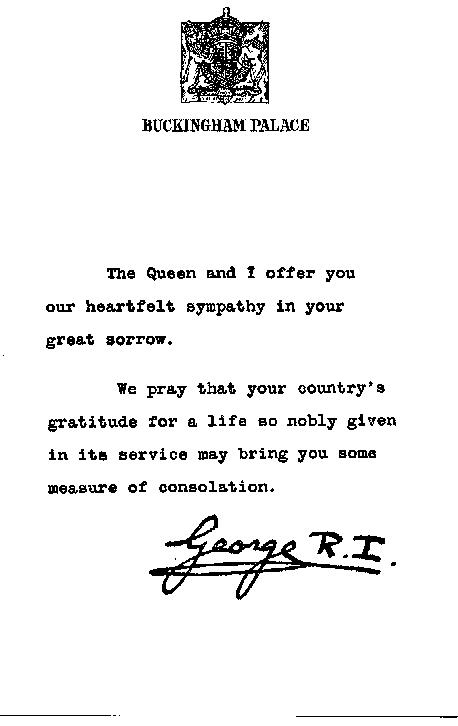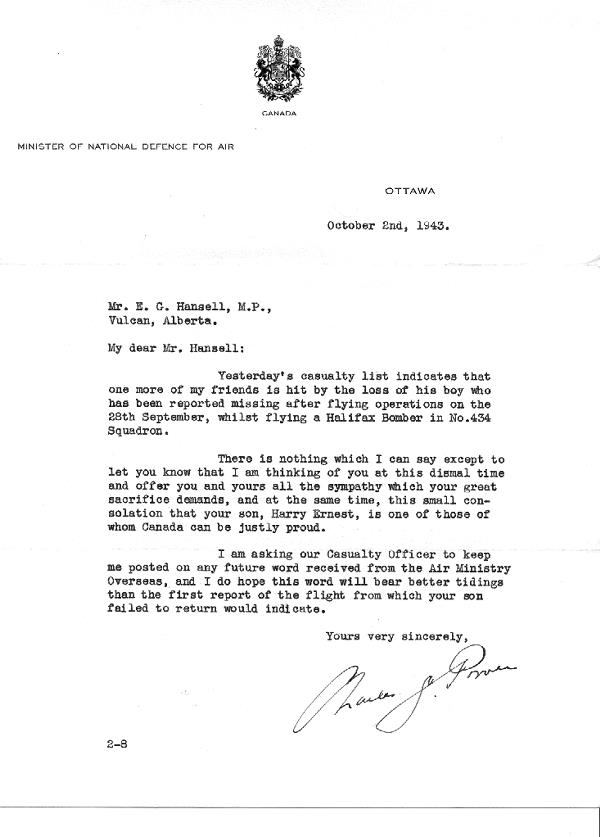|
Flight Sargents Harry Pedlar and Harry Hansell From "Harry's Story" http://www.telusplanet.net/public/dickieb/harry/Harry Hansell grew up in Edmonton, Alberta. His father was the long-time Member of Parliament for the riding. Harry enlisted in February 1942 and began operational missions in June 1943. Harry was part of flying Pilot Officer Orville Lytle's crew in a RCAF Halifax Mark V call sign LK-917. Another Harry - Harry Pedlar - was the navigator on the same crew. He came from Vulcan, Alberta. Here is part of their story: This is from Harry Hansell's flight diary for LK-917: August 22, 1943: Briefed for small town near Cologne, Leverkusen - airborne at 9:15 PM got to Knocke - engine went - had to return jettisoned bombs and got back safely to own base - returned early due to technical failure August 23, 1943: Berlin - used borrowed kite - poor shape - compressor went - managed to get back on track - outer port failed again - managed to get to Emden - plenty of flak - over sea 3 hours to get rid of enough petrol to land - landed safely with full load of bombs - really bounced on landing August 27, 1943: Air tested our own kite. Four left out of our course of 16 - went to Nurnberg - hit target - fireworks all colours - no trouble in navigation - landed at base in South England (orders to do so) - some kites badly damaged - friend of pilot officer missing - came back next morning - weather difficult August 27, 1943 Bombing run on Nurnberg - successful run August 31, 1943 Start of Leave (7 days) spent with Grandparents in Norwich September 6, 1943 End of Leave September 15, 1943: Montlucon - easy - rubber factory - saw huge columns of smoke rise - landed on south coast - weather too deep September 22, 1943: Hanover - successful trip - rubber works - huge fires - gave newspaper my name - hope folks don't get paper September 25, 1943: Ops on - hope it's Berlin - ops scrubbed September 26, 1943: Ops on again - hope we get away tonight - been ready twice, then scrubbed - 2nd dickie (pilot) with us September 27, 1943 bombing run on Hanover Here is the September 27th entry to the 434 Squadron's Operatinal Report: 73 Halifaxes from 419, 427, 428, 429, and 434 Squadrons were joined by 9 Wellingtons from 432 Squadron on an attack at Hannover. The crews were over the target at between 17,000 and 21,000 feet, releasing 229,000 lbs of incendiaries and 124,000 lbs of high explosives. According to reports, most of the bombing missed the target to the north. Of the 73 Halifaxes involved in the attack, eleven had to return to base due to mechanical problems, five were damaged by German flak or fighters, and eight were shot down. Harry's crew didn't return. The crew are initially listed as "missing". For months, the fate of the crew of LK-917 was uncertain: they might have landed behind enemy lines, they might have bailed out and been captured, they might have crashed and survived, or crashed and been killed. During the long months that followed their families grasped for any information that could shed light on their fate. They shared their anxiety through their letters to each other. News finally came, via the International Red Cross that the crew members had been killed, but only one body could be identified. Harry never came home. His name is one of thirty-three carved on the War Memorial in his home town, the small town of Vulcan, Alberta.  
 
1st October, 1946. Mr E.J. Hansell "B. Liggettich," R.A.F.C Casualty Officer, for chief of the Air Staff. |